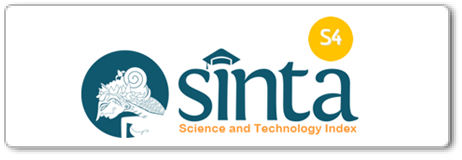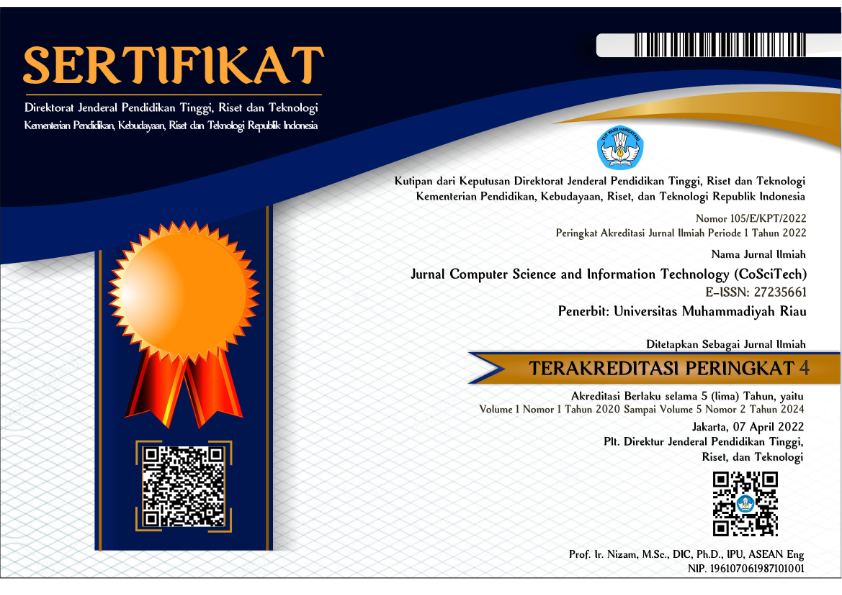Implementation of the XGBoost Algorithm for Predicting Monthly Regional Revenue Performance in Bandung City
DOI:
 https://doi.org/10.37859/coscitech.v6i2.9578
https://doi.org/10.37859/coscitech.v6i2.9578
Abstract
Abstract
Local Own-Source Revenue (PAD) is a key pillar in financing regional development. In Bandung City, discrepancies between revenue targets and actual realization remain a challenge to effective fiscal planning. This study aims to develop a predictive model for monthly PAD achievement using the XGBoost algorithm, known for its strength in handling non-linear and complex data. The dataset, obtained from the Bandung Revenue Agency (Bapenda), includes various types of regional taxes from 2018 to 2024. The research process involved data cleaning, feature engineering, data splitting, model training, and performance evaluation using MAE, RMSE, and R² metrics. The evaluation on test data resulted in MAE of IDR 5.6 billion, RMSE of IDR 9.3 billion, and R² of 73%. Meanwhile, 5-fold cross-validation yielded MAE of IDR 3.49 billion, RMSE of IDR 6.65 billion, and R² of 86%. These results demonstrate high accuracy and generalization capability. XGBoost proves to be a reliable decision-support tool for data-driven fiscal planning.
Downloads
References
S. V. Sofwan, M. Iqbaal, and S. Ramadhan, “PENGARUH PAJAK HOTEL DAN PAJAK RESTORANTERHADAP PENDAPATAN ASLI DAERAH (PAD)PADA PEMERINTAH KOTA BANDUNG PERIODE 2013-2020,” PENGARUH PAJAK HOTEL DAN PAJAK RESTORANTERHADAP PENDAPATAN ASLI DAERAH (PAD)PADA PEMERINTAH KOTA BANDUNG PERIODE 2013-2020, 2021.
T. T. Wulansari and D. Novandi, “Implementasi Linear Regression Untuk Estimasi Realisasi Pendapatan Asli Daerah Pemerintah Kota,” Implementasi Linear Regression Untuk Estimasi Realisasi Pendapatan Asli Daerah Pemerintah Kota , 2023.
M. Cahyaning, P. Putri, and ; Candradewini Candradewini, “PENDAPATAN DAERAH KOTA BANDUNG,” 2025.
M. Ramdhani et al., “Prediksi Capaian Bulanan Pajak Daerah Kabupaten Bandung Barat Menggunakan Metode Logistic Regression,” Journal of Information System Research (JOSH), vol. 5, no. 4, pp. 881–890, 2024, doi: 10.47065/josh.v5i4.5330.
F. Fitriyani, “Analisis Kesadaran Pajak dan Dampak Kenaikan PPN terhadap Pola Konsumsi Masyarakat,” Jurnal Ekonomi Bisnis Antartika, vol. 3, no. 1, pp. 69–74, Mar. 2025, doi: 10.70052/jeba.v3i1.698.
A. S. I. Jinan, “Studi Literatur Penerapan Machine Learning untuk Analisis Data Konsumen pada Minat Beli Konsumen,” 2024, doi: 10.38035/jmpd.v2i4.
G. Dwilestari, “PREDIKSI ADOPSI HEWAN PELIHARAAN MENGGUNAKAN METODE XGBOOST,” 2024.
S. Al Khairi, “PEMANFAATAN MACHINE LEARNING UNTUK PREDIKSI TARIF TOL MENGGUNAKAN ALGORITMA XGB REGRESSOR,” 2024.
A. Santriawan, Gunadi Widi Nurcahyo, and Billy Hendrik, “Prediksi Penjualan Sepeda Motor Yamaha dengan Jaringan Syaraf Tiruan dan Backpropagation (Studi Kasus: CV Sinar Mas),” Jurnal CoSciTech (Computer Science and Information Technology), vol. 5, no. 1, pp. 185–194, May 2024, doi: 10.37859/coscitech.v5i1.6709.
Muhammad Ramdani and Adhitia Erfina, “Pengaruh kualitas siak terhadap kepuasan mahasiswa di stikes sukabumi menggunakan regresi linier,” Jurnal CoSciTech (Computer Science and Information Technology), vol. 4, no. 1, pp. 50–55, Apr. 2023, doi: 10.37859/coscitech.v4i1.4477.













